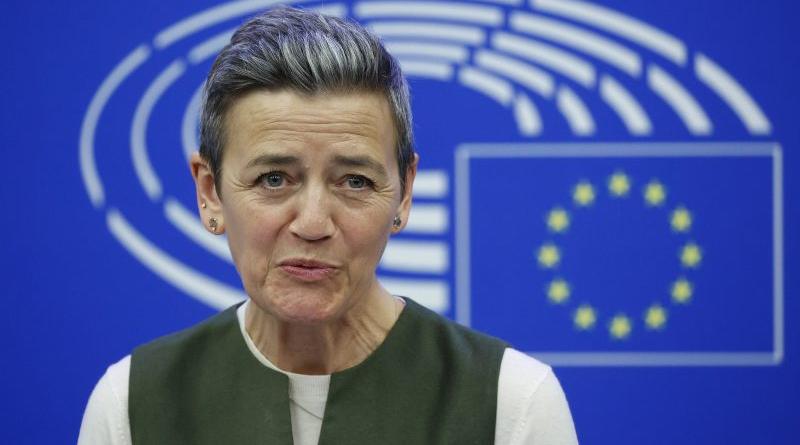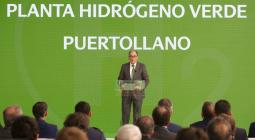Hydrogen industry slams commissioner over ‘counterproductive’ statements

European Commission Vice-President Margrethe Vestager has been criticised by the European hydrogen lobby group, Hydrogen Europe, following her remarks on the future role of hydrogen, in a letter seen by EURACTIV.
Much hope has been pinned on hydrogen as a key way to decarbonise Europe. Its proponents see it playing a complementary role to a renewable-centric future as its uses, including in steelmaking and as a basic chemical feedstock, are plentiful.
A future European hydrogen equipment industry, manufacturing electrolysers and related products, has subsequently been identified as a key priority in Brussels, prompting initiatives like the bloc’s hydrogen strategy, the hydrogen bank, and inclusion in the green industrial policy.
On 25 April, state aid chief Vestager told Danish magazine Finans that she would not greenlight state aid for hydrogen. “Hydrogen is not part of the scheme. This is because it is very expensive to transport,” she stressed.
Hydrogen is deemed challenging to transport due to its relatively low energetic density, and therefore, the risk of hydrogen producers moving to the US – where very favourable tax credits are on offer – is limited, the Danish Commissioner notes.
“If you want to be on the European market, the risk of moving production to the USA is not very great,” she added.
These statements have seemingly struck a nerve in Brussels, where the industry lobby group Hydrogen Europe is located.
Vestager “is about to cause significant damage to the European Hydrogen sector,” warned the lobby group’s CEO, Jorgo Chatzimarkakis, in a letter addressed to her office, seen by EURACTIV.
“[I]t sounds extremely counterproductive” if the EU’s state aid chief “undermines a clean tech that has been entrusted to her political responsibility,” the letter adds.
Chatzimarkakis, who notes that Vestager appeared to “contradict the current EU policy” in her statements, observed several technical misrepresentations made by the Commissioner in his letter.
Three are more technical, while the latter two are more political.
Technical disagreements
For one, Vestager said that “hydrogen is expensive to transport.”
The hydrogen lobbyist counters this by arguing that one Gigawatt-hour (GWh) of hydrogen is eight to 16 times cheaper to transport via pipeline than one GWH of electricity.
The argument apparently foregoes investment costs as hydrogen pipelines are more costly to produce and install than electricity lines, but experts readily agree that pipeline transport of hydrogen is the cheapest option.
Second, Vestager noted that “ammonia [a derivative of hydrogen] is not easy to transport.” According to the Commissioner, given the challenges in transporting ammonia, producers that want to service the European market are expected to produce on-site.
“The opposite is definitely true: bulk tankers transport ammonia today at low cost,” the letter stresses. As a matter of fact, tiny test shipments of ammonia from the UAE have made their way to European shores, landing in Hamburg last year.
Third, the Danish Commissioner argued that “you lose a lot of calories by converting solar and wind into hydrogen and then into ammonia.”
Her argument may hold when comparing hydrogen and ammonia to direct electrification, such as through heat pumps for household heat. Every conversion step brings with it a certain loss of energy.
But Chatzimarkakis argues that abundant green energy elsewhere, like in the Middle East, would go nowhere if it cannot be converted to hydrogen.
“So why not rather use it, even with a low (but bigger than zero!) efficiency to save carbon emissions,” he added.
The political
Vestager dropped another two bombshells on the European hydrogen industry. For one, the state aid chief said she’d not allow the EU countries to match the US’ generous hydrogen production subsidy scheme.
“I will not allow member states to match US support for the production of green hydrogen and liquid sustainable fuels,” she told the Danish magazine.
That is a blow to the hydrogen producers that Chatzimarkakis represents and his liberal FDP colleagues in Berlin, who bet on liquid sustainable fuels (e-fuels) to decarbonise transport. The hydrogen lobby chief served two terms in the European Parliament, from 2004 to 2014, on behalf of the FDP.
“Your general statement intimidates possible investors discrediting support for hydrogen,” the lobby CEO stressed. “What’s the purpose of this bold statement that does not even mirror your decisions currently taken in favour of some hydrogen projects of that kind?”
Lastly, Vestager had said hydrogen “is not part of the scheme” that relaxes EU state aid rules via the temporary crisis and transition framework (TCTF). “Hydrogen production is included in that scheme with regards to the production of electrolysers,” the lobby chief counters.
“The only raison d’être of electrolysers is the production of green hydrogen. They will not be used for anything else.”
Chatzimarkakis and his ambitions for hydrogen were recently made the subject of a debunk article by clean energy expert Michael Liebreich after a discussion on the latter’s podcast.
The leading thinker called the lobby chief “Europe’s Hydrogen Pusher.”
cover photo:The hydrogen lobby group Hydrogen Europe has come out strongly against state aid chief Magrethe Vestager following her remarks about the EU's support for hydrogen. [EPA-EFE/JULIEN WARNAND]






